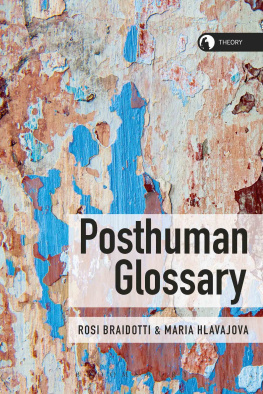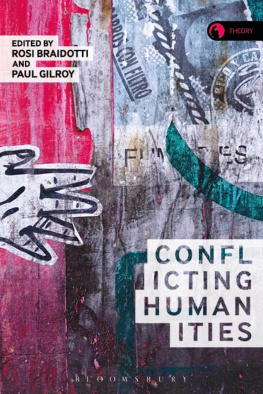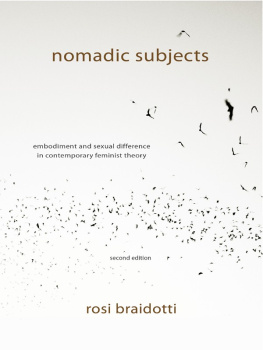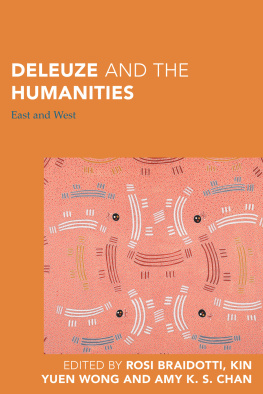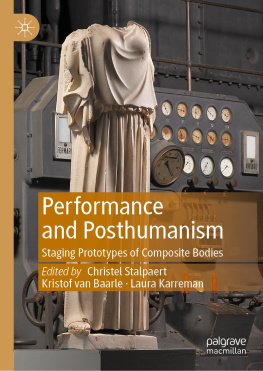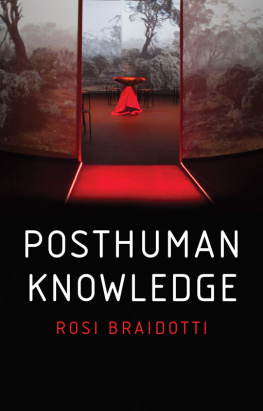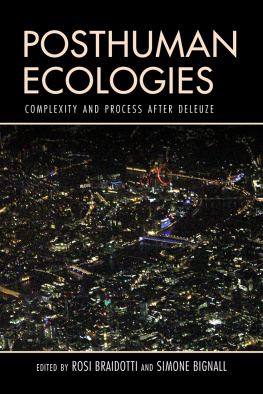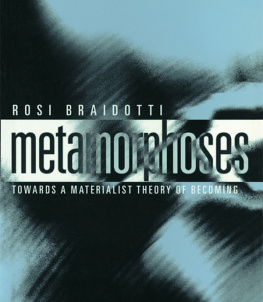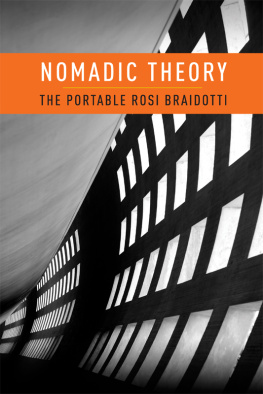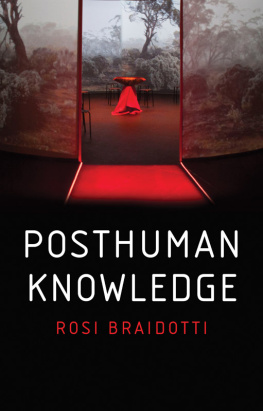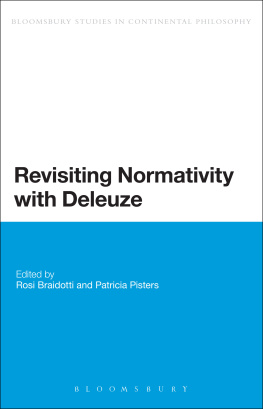Braidotti Rosi - Posthuman Glossary
Here you can read online Braidotti Rosi - Posthuman Glossary full text of the book (entire story) in english for free. Download pdf and epub, get meaning, cover and reviews about this ebook. year: 2018;2016, publisher: Bloomsbury UK, genre: Politics. Description of the work, (preface) as well as reviews are available. Best literature library LitArk.com created for fans of good reading and offers a wide selection of genres:
Romance novel
Science fiction
Adventure
Detective
Science
History
Home and family
Prose
Art
Politics
Computer
Non-fiction
Religion
Business
Children
Humor
Choose a favorite category and find really read worthwhile books. Enjoy immersion in the world of imagination, feel the emotions of the characters or learn something new for yourself, make an fascinating discovery.
- Book:Posthuman Glossary
- Author:
- Publisher:Bloomsbury UK
- Genre:
- Year:2018;2016
- Rating:3 / 5
- Favourites:Add to favourites
- Your mark:
- 60
- 1
- 2
- 3
- 4
- 5
Posthuman Glossary: summary, description and annotation
We offer to read an annotation, description, summary or preface (depends on what the author of the book "Posthuman Glossary" wrote himself). If you haven't found the necessary information about the book — write in the comments, we will try to find it.
Posthuman Glossary — read online for free the complete book (whole text) full work
Below is the text of the book, divided by pages. System saving the place of the last page read, allows you to conveniently read the book "Posthuman Glossary" online for free, without having to search again every time where you left off. Put a bookmark, and you can go to the page where you finished reading at any time.
Font size:
Interval:
Bookmark:

GLOSSARY
ALSO AVAILABLE IN THE THEORY SERIES
Conflicting Humanities, edited by Rosi Braidotti and Paul Gilroy
General Ecology, edited by Erich Hrl with James Burton

This volume is the culmination of a seminar series, Posthuman Glossary, at BAK, basis voor actuele kunst, Utrecht in 2015. The series was conceptualized by Rosi Braidotti and realized in the context of BAK research project Future Vocabularies/HumanInhumanPosthuman and in cooperation with the programme The Humanities in the Twenty-First Century of the Centre for the Humanities at Utrecht University, Utrecht.
The co-editors Rosi Braidotti and Maria Hlavajova would like thank the large, hard-working and dedicated teams that set up the initial seminar series in both institutions, and the equally talented team of editors and assistants who helped with the final publication. Special gratitude to Tobijn de Graauw and Toa Maes for input at both the content and the organizational level. Our heartfelt thanks to the managing editor of the editorial assistants team Goda Klumbyt, who maintained the main contact with the authors, co-ordinated the editing of the manuscript and completed the complex bibliographical details, with the help of Elisa Fiore.
Thanks also to image editor Lucy Lopez, author editor Tom Clark, editorial assistants Hidde van Greuningen and Gry Ulstein, and copy-editor Stephanie Paalvast. We are also grateful to many colleagues from the Utrecht University, the Centre for the Humanities and the BAK team for participating in the events that led to this publication.
Sincere thanks are owed to all contributors to this volume, including the artists who contributed their visual work and made Posthuman Glossary an interdisciplinary conversation.
Last but not least, the co-editors wish to acknowledge, through this volume as much as through the many projects in their decade-long collaboration, that the academic and the artistic institutions belong to, and are accountable for, one and the same world.
Theory is back.
Critical theorists of the universal, organic or situated kind used to be defined by their ethical-political commitment to account for power relations at work in the real world, as well as in scientific practice. But their prestige waned throughout the 1990s. The theory wars in the USA targeted critical theory as an outdated ideological activity, dismissing the theorists as tenured radicals. They were replaced by new content providers, experts and consultants, in a context of increased privatization of academic research. By the turn of the millennium, with the internet as the only true content provider, former theorists were relocated to the market-oriented position of ideas brokers and, in the best cases, ideas leaders. Nowadays, we are all entrepreneurs of the mind. The cognitive character of contemporary capitalism and its high technological mediation paradoxically produced a post-theory mood and intensified attacks on radical thought and critical dissent. This negative mood also resulted in criticism of the social and scholarly value of the Humanities, in a neo-liberal corporate university ruled by quantified economics and the profit motive.
And yet, the vitality of critical thinking in the world today is palpable, as is a spirit of insurgency that sustains it. Theoretical practice may have stalled in the academic world, but it exploded with renewed energy in other quarters, in media, society, the arts and the corporate world. New generations of critical studies areas have grown alongside the classical radical epistemologies of the 1970s: gender, feminist, queer, race, postcolonial and subaltern studies, cultural studies, film, television and media studies. The second generation of critical studies areas includes animal studies and ecocriticism; cultural studies of science and society; religion studies; disability studies; fat studies; success studies; celebrity studies; globalization studies; and many more. New media has spawned new meta-fields: software studies, internet studies, game studies, digital postcolonial studies and more. The end of the Cold War has generated conflict studies and peace research; human rights studies, humanitarian management; human rights-oriented medicine; trauma, memory and reconciliation studies; security studies, death studies; suicide studies; and the list is still growing. These different generations of studies now constitute a theoretical force to be reckoned with.
Theory is back!
This series aims to present cartographic accounts of these emerging critical theories and to reflect the vitality and inspirational force of ongoing theoretical debates.
Rosi Braidotti
Stacy Alaimo is Professor of English, Distinguished Teaching Professor, and Director of the Environmental and Sustainability Studies Minor at the University of Texas at Arlington. Her publications include Undomesticated Ground: Recasting Nature as Feminist Space (2000), Bodily Natures: Science, Environment, and the Material Self (2010) and Protest and Pleasure: New Materialism, Environmental Activism, and Feminist Exposure (2016).
John Akomfrah (born 1957 in Accra, Ghana) lives and works in London. He has had numerous solo exhibitions including Nikolaj Kunsthal, Copenhagen, Denmark (2016), Arnolfini, Bristol, UK (2016), Bildmuseet Ume, Sweden (2015), Eli and Edythe Broad Art Museum, Michigan, USA (2014), Tate Britain, London, UK (201314) and a week-long series of screenings at MoMA, New York, USA (2011).
Ramon Amaro is Associate Lecturer in Critical Theory and Media Philosophy at the Centre for Cultural Studies, Digital Culture Unit, Goldsmiths, University of London. His joint academic background in philosophy, sociology and engineering comes to fruition in his research looking at the philosophical dimensions of computer modelling of social processes, with particular reference to black ontology and algorithmic equality in machine learning systems.
Cecilia sberg is Professor at Linkping University, Sweden. She leads The Seed Box: A MistraFormas Environmental Humanities Collaboratory, the largest post-conventional eco-humanities initiative in Sweden. She directs the research group The Posthumanities Hub, and co-directs the three-university centre for gender excellence, GEXcel International Collegium for Advanced Transdisciplinary Gender Studies. Her postdisciplinary research in gender studies translates into feminist posthumanities.
Lila Athanasiadou is a freelance writer, researcher and exhibition designer and the coordinator of the Corporeal Discourse program at the Master of Interior Architecture at ArtEZ. She has recently graduated from the Master of Architecture at TU Delft with a thesis on rethinking pedagogical practices through Guattaris metamodelling, examined through the genealogical relationships between Athens and Kassel as dramatized in the spatiality of documenta (14).
Daniel Baker is an artist, curator and theorist. A Romani Gypsy born in Kent, he holds a PhD in Gypsy aesthetics from the Royal College of Art, London. Baker acted as exhibitor and advisor to the first and second Roma Pavilions; Paradise Lost and Call the Witness at the 52nd and 54th Venice Biennales respectively. His art and writing examine the role of art in the enactment of social agency. Recent publications include We Roma: A Critical Reader in Contemporary Art
Next pageFont size:
Interval:
Bookmark:
Similar books «Posthuman Glossary»
Look at similar books to Posthuman Glossary. We have selected literature similar in name and meaning in the hope of providing readers with more options to find new, interesting, not yet read works.
Discussion, reviews of the book Posthuman Glossary and just readers' own opinions. Leave your comments, write what you think about the work, its meaning or the main characters. Specify what exactly you liked and what you didn't like, and why you think so.

